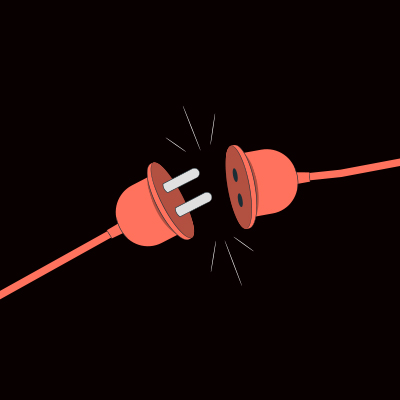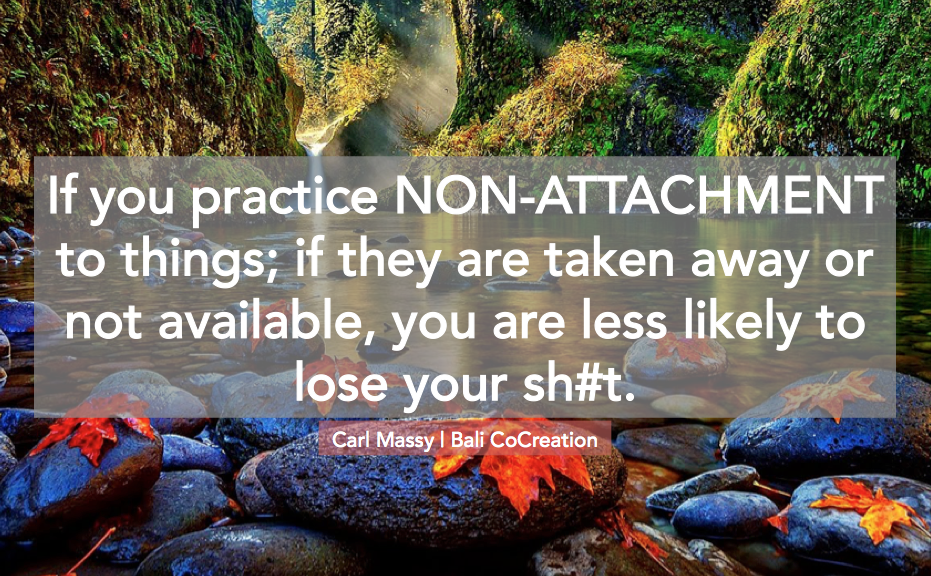
If you have read any books relating to Eastern philosophies, or yoga, or Buddhism, or even the Greek and Roman stoics; you are likely to have heard of the practice of ‘non-attachment.‘
Plus if you have followed me for awhile, you would have heard me slip it in – more than once.
WHY?
Because attachment is such a powerful force.
And because we are operating on autopilot (subconscious programs of the brain and autonomic system) well over 90% of the time, having more awareness of what we are, or are not attached to, is hugely beneficial.
And of course there is a very different outcome based on what you are attached to – i.e. sugar versus daily physical activity.
One is taking you two steps forward, and the other two steps back.
So it is not only the practice of non-attachment, but an awareness of what you might be attached to.
Is an attachment beneficial or detrimental to your physical and mental health?
That’s where we are going today.
The detrimental side of attachment
DISCOVER WHY THE PRACTICE OF ‘NON-ATTACHMENT’ HAS STOOD THE TEST OF TIME.
If you have read any books relating to Eastern philosophies, or yoga, or Buddhism, or even the Greek and Roman stoics; you are likely to have heard of the practice of ‘non-attachment.’
Plus if you have followed me for awhile, you would have heard me slip it in – more than once.
WHY?
Because attachment is such a powerful force.
And because we are operating on autopilot (subconscious programs of the brain and autonomic system) well over 90% of the time, having more awareness of what we are, or are not attached to, is hugely beneficial.
And of course there is a very different outcome based on what you are attached to – i.e. sugar versus daily physical activity.
One is taking you two steps forward, and the other two steps back.
So it is not only the practice of non-attachment, but an awareness of what you might be attached to.
Is an attachment beneficial or detrimental to your physical and mental health?
That’s where we are going today.
The detrimental side of attachment
The worst case scenario, when it comes to attachment, is actual addiction.
And these days, it is easier then ever, to have an ‘addiction’ of some sorts, that is more socially acceptable.
You can actually be addicted to sugar, if you are unable to ‘go without’ sugar, sweets or treats for an extended period of time, without emotional or physical cravings.
Many people are addicted to social media, where they feel anxiety if they don’t check-in on social media every 5-10 mins.
Maybe it is addiction to a mobile phone, where there is anxiety if it is not within sight or reach.
Obviously the word ‘addiction’ is pretty tough to swallow, so let’s switch the vernacular back to “strong attachment”, but you get the point.
We need to be more CONSCIOUSLY aware of the things we are (strongly) attached to.
Essentially it is those things we feel we can not do without, or we have cravings for, or we experience physical symptoms (e.g. anxiety or worse) when they are removed from us.
I am not an expert on addiction, so I will not go deeper into that.
However I recently read a book called ‘Brain Reset‘ by David Gillespie which does go deeper into the subject if you are interested.
One thing Gillespie dives deeply into is the brain’s Risk-Reward system and it’s relationship to dopamine, serotonin, oxytocin based on a more modern understanding of nuerochemisty. And how the Risk-Reward system can be compromised and misaligned.
The social media algorithms, for example, know what you really want to see, but also know more dopamine will be triggered, if on your social media feeds, the things you really like (which they know) are delivered in a RANDOM fashion. This creates more anticipation and uncertainty for the brain, and in turn a greater dopamine hit. Dodgy buggers!!
The stoics of ancient Greece (2000 year ago) didn’t have any fMRI or EEG machines or the likes, but they still knew that attachment, could be detrimental if you were strongly attached to non healthy practices or substances.
Okay, so that is the downside, now let’s look to what we can do.
The practice of Non-Attachment (theory)
You know I like to keep things practical, and relevant, so let’s dig in.
The Yogi’s Buddhists, Monks, Saint, Sages, and Stoics all practiced different forms of non-attachment, but they supported the same philosophy.
In a very general sense, it was the idea that not being attached to things, allowed a more consciously determined life experience, plus greater equanimity and acceptance if something was taken away from you, lost, or no longer unavailable.
They acknowledged, that without attachments, you could make wiser decisions.
Decisions which would be most beneficial in the long-term.
Because the decisions were not attached to short-term physical or emotional pleasure, or unconscious neurological programs.
What did their practice look like?
In a word or two: “Going without“.
Did that make you cringe?
Going without food for a period of time (apparently Socrates did a 10-day water-only fast each year).
Going without alcohol for a period of days, weeks or months.
Going without sweet (sugar-based) food for a period or days or weeks.
Going without sex for a period of time (sometimes a lifetime).
Now I am not suggesting we need to become monks.
What I am suggesting is there is A LOT OF BENEFIT to practicing what it feels like to go without.
I believe three principle things happen when you do this:
- You become psychologically more powerful (more in control of self, more self-aware, higher self-esteem, and more),
- You start to reset the Risk-Reward system in the brain (the brain chemistry show).
- You get to experience physical health benefits.
The practice of Non-Attachment (practical)
This is what I do, and suggest to my clients, who want to jump on the self-mastery or self-actualization path.
Practice GOING WITHOUT something you are strongly attached to, for a period of time (1 week to 1 month).
Things you might choose include:
- Sugar, sweets and treats (most people are overly attached to sugar and a month has HUGE benefits).
- Alcohol (21 days has a nice ring to it).
- Social media (try a few days, and work up to a week).
- Television (or specific things like Netflix).
- Mainstream Media (I recommend going without this for a year or 23.
- Coffee (you can do it).
- Technology (this can be for hours or days).
- What people think of you (this is a good lifetime practice).
- Food (I practice intermittent fasting and water-only fasting regularly (2-3 days) and the health benefits are HUGE!!!).
Making WISE life decisions, is harder if our body is controlling us, rather than our conscious minds controlling our bodies.
The key points (and summary)
Obviously I could talk a LOT more on this subject.
Non-Attachment is a philosophy that has been practiced for 1000’s of years and for good reason.
The highest practice is to be attached to nothing, but fully engaged with life.
The next most useful practice is non-attachment to things which are detrimental to our physical and mental health.
Practice GOING WITHOUT for periods of time (start small and build up).
Strengthening your mind and fortitude by this practice flows over into all areas of your life.
If you practice non-attachment, when things are taken away or not available, it’s no big deal (= more chilled life).
My parting words
Addiction is not a pleasant word or subject, but it’s important to address in grown-up conversations.
Awareness (with curiosity) is always the best starting place.
It’s a very empowering thing to know you can GO WITHOUT and not lose your sh#t.
That is what all the wisest men and women throughout history have known.
It’s time for the higher mind to lead our bodies.
So…what are you going to GO WITHOUT?
As always, if I need a helping hand, especially with this profound practice, don’t hesitate to reach out.
Have fun taking your power back today, and for the rest of the week.
Take care,
Carl

